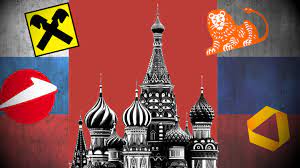
U.S. Treasury Secretary Janet Yellen told Reuters that the dangers for European banks doing business in Russia are increasing and that the country is considering tightening its secondary sanctions against banks that are discovered to be supporting transactions related to Russia's military campaign.
In an interview with Reuters, Yellen stated, "We are looking at potentially a tougher stepping-up of our sanctions on banks that do business in Russia," however she would not name any individual institutions or offer any details.
Yellen stated that sanctions pertaining to banks' operations in Russia would only be applied "if there was a reason to do so, but operating in Russia creates an awful lot of risk" during remarks made on the fringes of a G7 financial chiefs conference in northern Italy.
When asked if she supported the withdrawal of Italian bank UniCredit and Austrian bank Raiffeisen Bank International from Russia, Yellen stated, "I think their supervisors have advised them to be extremely careful about what they do there."
On Saturday, European Central Bank policymaker Fabio Panetta gave reporters explicit instructions for Italian banks, asking them to "get out" of Russia as continuing to do so would create a "reputational problem."
The biggest European lender operating in Russia is Raiffeisen, with UniCredit following closely after. Intesa Sanpaolo, a significant Italian lender, is now in the process of divesting its operations in Russia.
President Joe Biden of the United States has granted the Treasury the right to remove banks from the American financial system in the event that it is discovered that they are aiding in the evasion of main sanctions on Russia and other entities due to Moscow's conflict in Ukraine.
According to Yellen and other U.S. Treasury officials, it is becoming harder to discern between transactions with dual uses or those are for civilian and military purposes since Russia's economy is becoming into a "war economy."
Though Yellen has voiced worry that Russia is finding ways to purchase items required to enhance its military production—citing transactions through China, the United Arab Emirates, and Turkey—the introduction of the secondary sanctions has already cooled banks' participation with Russia.
According to a person who has seen the correspondence, earlier this month, the Treasury warned Raiffeisen in writing that its access to the dollar-denominated financial system could be terminated due to its dealings with Russia. The Treasury cited a proposed 1.5 billion euro ($1.6 billion) deal with a sanctioned Russian tycoon.
A setback for the lender came more than two years after the invasion of Ukraine when Raiffeisen cancelled plans for the industrial venture connected to oligarch Oleg Deripaska following the warning.
The pressure demonstrated Washington's readiness to hold European banks accountable for their connections to Russia.
Yellen cautioned bank CEOs on Tuesday in Frankfurt, the financial hub of Germany, to intensify their efforts to abide by the sanctions on Russia and cease any attempts at circumvention in order to prevent the possibility of serious fines.
(Source:www.usnews.com)
In an interview with Reuters, Yellen stated, "We are looking at potentially a tougher stepping-up of our sanctions on banks that do business in Russia," however she would not name any individual institutions or offer any details.
Yellen stated that sanctions pertaining to banks' operations in Russia would only be applied "if there was a reason to do so, but operating in Russia creates an awful lot of risk" during remarks made on the fringes of a G7 financial chiefs conference in northern Italy.
When asked if she supported the withdrawal of Italian bank UniCredit and Austrian bank Raiffeisen Bank International from Russia, Yellen stated, "I think their supervisors have advised them to be extremely careful about what they do there."
On Saturday, European Central Bank policymaker Fabio Panetta gave reporters explicit instructions for Italian banks, asking them to "get out" of Russia as continuing to do so would create a "reputational problem."
The biggest European lender operating in Russia is Raiffeisen, with UniCredit following closely after. Intesa Sanpaolo, a significant Italian lender, is now in the process of divesting its operations in Russia.
President Joe Biden of the United States has granted the Treasury the right to remove banks from the American financial system in the event that it is discovered that they are aiding in the evasion of main sanctions on Russia and other entities due to Moscow's conflict in Ukraine.
According to Yellen and other U.S. Treasury officials, it is becoming harder to discern between transactions with dual uses or those are for civilian and military purposes since Russia's economy is becoming into a "war economy."
Though Yellen has voiced worry that Russia is finding ways to purchase items required to enhance its military production—citing transactions through China, the United Arab Emirates, and Turkey—the introduction of the secondary sanctions has already cooled banks' participation with Russia.
According to a person who has seen the correspondence, earlier this month, the Treasury warned Raiffeisen in writing that its access to the dollar-denominated financial system could be terminated due to its dealings with Russia. The Treasury cited a proposed 1.5 billion euro ($1.6 billion) deal with a sanctioned Russian tycoon.
A setback for the lender came more than two years after the invasion of Ukraine when Raiffeisen cancelled plans for the industrial venture connected to oligarch Oleg Deripaska following the warning.
The pressure demonstrated Washington's readiness to hold European banks accountable for their connections to Russia.
Yellen cautioned bank CEOs on Tuesday in Frankfurt, the financial hub of Germany, to intensify their efforts to abide by the sanctions on Russia and cease any attempts at circumvention in order to prevent the possibility of serious fines.
(Source:www.usnews.com)





